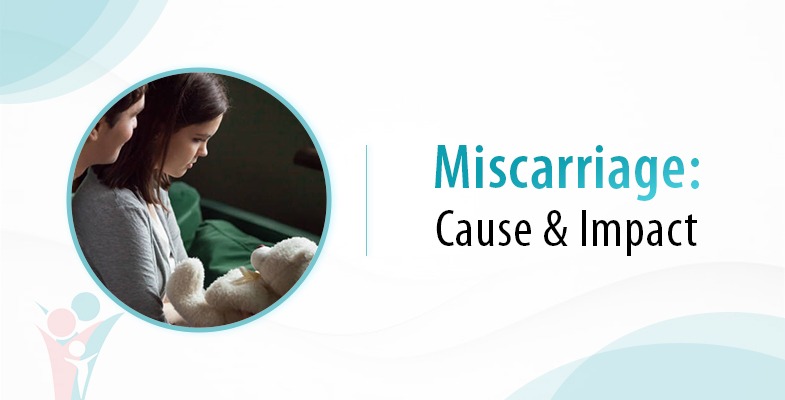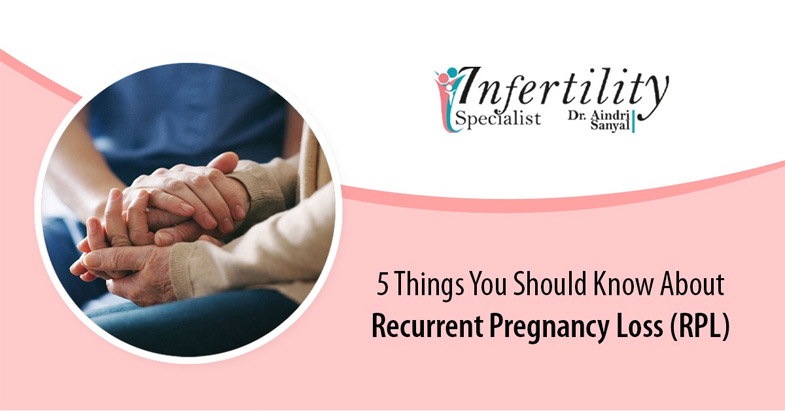
A “spontaneous miscarriage” is the loss of a pregnancy before gestation of 20 weeks. Nearly 80% of spontaneous miscarriages occur within the first 12 weeks of pregnancy. While approximately one in four pregnancies end in miscarriage, many of these unfortunate events aren’t detected since these occur very early during pregnancy.
What causes a miscarriage?
A miscarriage usually occurs because the pregnancy is not developing properly. While a large number of miscarriages occur as a result of genetically abnormal embryos, there could be a plethora of factors responsible. These include:
# Random chromosome disorders
# Blood clotting disorders
# Hormonal disorders
# Submucosal fibroids
# Structural abnormalities in the womb
# Hormonal issues linked to polycystic ovaries
# An inherited genetic abnormality
# Being over 35 years of age, with a decline in quality of eggs
# For men over 40, the quality of sperm decreases, raising the risk of miscarriage
How does a woman understand that she’s having a miscarriage?
Look out for the following signs:
# Heavy bleeding
# Severe abdominal or shoulder pain
# Fever or chills
# Dizziness or fainting
# Vaginal discharge with an unpleasant odor
# Diarrhoea or cramps
A miscarriage can trigger a whole gamut of emotional upheaval, particularly in the woman. Regardless of whether the pregnancy is planned or unplanned, the emotional impact of miscarriage can be great, and that’s perfectly normal. A sense of profound loss is very common and expected, and though people may react differently to this tragic event, the loss can bring on:
# A sense of total emptiness
# Anger and utter disbelief
# A crestfallen feeling
# Acute melancholy and a sense of isolation
But remember that it’s important to stay positive while riding out the emotional rollercoaster, and summon up enough courage and willpower to try again. This is when one needs the love and support of family and friends. Do not shut out the people who care for you and do not hesitate to turn to them for encouragement and support.
Do not give up hope, you have to try again!
However, while trying for another pregnancy after a miscarriage, remember to:
# Quit smoking
# Exercise regularly and follow a balanced diet
# Reduce stress
# Watch your weight
# Take folic acid tablets
Is any treatment required for a miscarriage?
Once a miscarriage has begun, it can’t be reversed. So the doctor would typically try to prevent heavy bleeding and infection as the main treatment protocols, besides providing emotional support. Heavy bleeding with clots and cramps would indicate that the patient is still passing the pregnancy tissue. These symptoms should settle once most of the pregnancy tissue has been passed.
Sometimes, following a miscarriage, some residual pregnancy tissue remains in the uterus. Doctors then use a spoon-shaped instrument called a curette to scrape the uterus, a procedure called ‘dilation and curettage’, usually performed under a light general anaesthetic and the patient can go home the same day.
The role of IVF in miscarriage
In recurrent miscarriages, IVF or In Vitro Fertilization with genetic testing “can significantly minimize the risk of miscarriage and improve chances for a safe and successful pregnancy”.
# Genetic screening: Since genetic abnormalities in the embryo are the most prevalent cause of miscarriage, genetic screening is a very useful tool.
# Embryo screening: Doctors can now screen for chromosomal abnormalities and identify the healthiest embryo for implantation with a very high degree of accuracy.
# Frozen embryo transfer: In thisform of IVF treatment, a cryopreserved embryo created in a full IVF cycle is thawed and transferred to a uterus.
# Single embryo transfer: In thisprocedure, a single embryo, selected from a larger pool of available embryos, is placed in the uterus.
# Fertility care: This is extremely beneficial since tests prior to treatment can determine the risk for miscarriage and, possible contributing factors.
# Supervision & monitoring: Close supervision and monitoring is part of fertility care and helps mitigate risk and optimize chances for an ongoing pregnancy and live birth.
A miscarriage is more often than not precipitated by a combination of factors over which one had little control and it’s a wrong notion that the event has a propensity to recur. Women who have miscarried once or twice, are usually not sent for tests since it’s highly unlikely that anything would be found amiss. However, those who have had three back-to-back miscarriages, are at risk of miscarrying again, and must seek medical advice.



